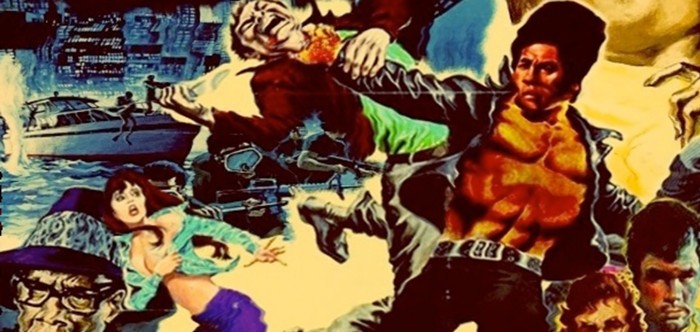Thurs March 17
Crystal Ballroom
1332 W Burnside
I'm not going to pretend to know Decemberists' frontman Colin Meloy. But there was a period in the last six months where he kept insisting I meet him at these dusty old museums near the tip of Manhattan for a string of interviews. In my line of work, we call this "color." It's when you take something as relatively uninteresting as two total strangers talking about music and make it seem more interesting by placing it in a context that allows it to seem that way. For instance, I once walked through an eight-foot plastic replication of the human heart with Billy Corgan. It was in Chicago on the day his new band's first album came out and there were a lot of children in snow boots. Outside there was a snowstorm. That sounds like a joke, but it's not. Maybe it also sounds more interesting than it was. If so, well, that's great. The job of a writer in any form is to essentially make the mundane appear otherwise fascinating and large scale and envious. If in reality following around a famous musician with a pen and a notepad becomes somewhat routine after the umpteenth time you've done it, when you inevitably put it down in ink it should appear as somewhat fantastic, ridiculous, or both. That's the whole point, Bukowski.
The reason I bring this up now is because Colin Meloy is a writer. If you believe the eighth song on his band's new CD Picaresque (the follow up to 2002's breakthrough Her Majesty The Decemberists), he is a writer of fictions. Which is to say that he probably understands this more than he's expected to. The way Meloy described Picaresque to me when we met on the steps of some museum uptown two months ago was "fantastic." During our conversation, I often called the album "ridiculous." You can probably assume he prefers the label "fantastic" because it sounds less insulting, but he's also aware of what I'm getting at. Meloy is the single most misunderstood and promising songwriter to emerge from the Pacific Northwest music scene in the last five years because of this very divide. He uses arcane words in songs that most people can't pronounce, and he uses them in the chorus. There probably hasn't been a songwriter this intentionally literary or authentic since The Queen Is Dead, and maybe not even then.
Meloy's father had always hoped that his son would become an electrician (or at least something as practical) but that's insane, considering that this was the same man who took part in giving him three first names. His path was already chosen. Colin Patrick Henry Meloy blew off his father's advice a long time ago to become a drama student, then a fledgling musician. Now he's some blend of the two.
"I was always a really introverted kid," Meloy said when we talked later at his girlfriend's parents' apartment off of Central Park. "I was always really nerdy and had a hard time making friends. [Drama] marked this remarkable sea change in me," he insists. "Having the theater for me was a huge deal. I met this whole crowd that was really similar to me and they shared this desire to connect and to find a different identity."
The roles that Meloy occupies on Picaresque, then, are not that detached from what you would expect from a former theater major now fronting a seven piece folk band: dramatic and hysterical, if not perfectly indulgent. The best and only roles that Meloy plays now are in song: on Picaresque's "Sixteen Military Wives" he is either the wife of a soldier or an anchorman; on "The Infanta" he might be whatever it is that you call the guy who leads a safari. Meloy almost never seems like a singer-songwriter and it seldom ever feels like he's baring his soul. That he appears to be relating to a life that ended too soon on the dourly strummed "Eli, The Barrowboy" becomes unintentionally funny when said Barrowboy drowns wearing corduroy. "Before I wasn't really willing to take the risk of putting myself out there," Meloy says. "I think, though, that as I became accustomed to the form, I began playing around with that and began taking cues from someone like Morrissey who was toying with public perception."
This is one explanation for why some of the best songs on Picaresque are the most difficult to relate to. "The Sporting Life" is, just as much as the name implies, about sports--probably soccer, though it could very well be about football. It does skipping indie folk better than the last three Belle And Sebastian records and climaxes with the song's narrator lying on his back, staring at the vein on his bulbous coach's forehead and his disappointed father screaming in the stands. On a record that alternates between a lot of orchestral wagon circling and shivery melodies, "The Sporting Life" is undeniably where Meloy chooses to be obvious, singing: "I am lying here/ Trying to fight the tears" over the idea of missing a goal. This is purposefully absurd and like almost everything that Meloy touches, "The Sporting Life" is dramatic and occasionally embarrassing. But musically it's stunning. Suddenly, it's no longer about a 12-year-old forward.
"If I had my druthers I would only write completely fictional songs," Meloy says. "I can't be so in earnest about everything. Especially with things like love songs. So there is a sort of a question: 'Is it real or is he making fun of himself?' I don't even know sometimes. I think that's why people are attached to it. They feel that way themselves, they can laugh at the absurdity of it. There is comedy there."
These are the moments where you either fall in love with the Decemberists or snicker about them to your friends. And while a lot of Picaresque seems inversely related to "confessional" songwriters like Conor Oberst or The Arcade Fire's Win Butler, it's insanely more genuine by comparison. This is a singer who can convince those too literate for such simple emotions into believing he is one of their own and he can do so while keeping his identity obscured by opinion. I'm still not sure what I find most fascinating about Colin Meloy: that his emotions are as normal as mine or that he's smart enough to know when to romanticize them. But there is a lot of truth in a songwriter who will insist that a song called "My Mother Is A Chinese Trapeze Artist" is actually autobiographical. By the way, Meloy's mother is a public health consultant.


















